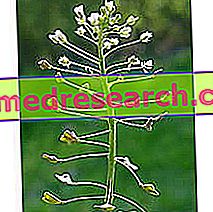What is Maca?
Maca, also known as Andean ginseng or Peruvian ginseng, is made up of the root of Lepidium meyenii Walp. (Fam. Brassicaceae ), a plant typical of the Andean areas that grows at rather high altitudes (3500 - 4500 meters).

Property
The drug is rich in carbohydrates (60%), proteins (10%), amino acids, minerals - particularly calcium (150 mg / 100g), iron (16.6 mg / 100g), selenium, iodine and zinc (3, 8 mg / 100g) - fiber (8.5%) and fat (2.2%).
By virtue of this richness in macro and micronutrients, Maca has a remarkable nutritional value, which for Peruvian populations is comparable to that of our cereals.
In Italy, the dried root of Lepidium is used above all for its adaptogenic, immunostimulant and aphrodisiac properties.
Adaptogenic properties
The first term is common to all those drugs, such as ginseng and eleuterococcus, able to increase the body's ability to adapt to stressing agents of various kinds (physical, mental, work, sports, pathological etc.), avoiding the damage that can result from these conditions without causing important side effects.
Aphrodisiac properties
Without a doubt, the most publicized and sought after feature by Maca consumers lies in its ability to increase sexual energy. This characteristic is supported by Peruvian folk medicine and by some recent studies, mainly carried out on rodents. In the first treatment period, mice fed with Maca extracts increased the volume of their testicles and the amount of sperm produced (1).
In other research, carried out on adult patients, it has been observed that the administration of maca for 4 months induced an increase in the spermatic volume, the number of spermatozoa and their activity, with a subjective improvement in sexual desire (compared to placebo), without significantly affect blood levels of testosterone or estradiol (2-4). These effects would be attributable to some alkaloids and phytosterols or, more simply, to the set of macro and micronutrients present in the root. The latter would also be responsible for its supposed ergogenic effect (useful for athletes) and tonic.
However, the studies carried out so far are not sufficient to confirm the aphrodisiac properties of the Lepidium meyenii root.
Mode of use
The dosage used in the two researches conducted on adult individuals was between 1500 and 3000 mg / day (from 3 to 6 gelatinised capsules containing 500 mg of dehydrated Maca root).
Side effects
The risks deriving from the consumption of Maca seem to be minimal (in Peru its nutritional applications are vast and supported by a centuries-old tradition). It is not recommended for use during pregnancy, lactation or in the presence of thyroid, prostatic or endocrine disorders.
In maca roots there are high concentrations of glycosolates, gozzigene substances that - in combination with a diet low in iodine - can cause goiter. It should however be specified that the iodine content in maca roots is significant, especially in those of a darker color (red, blackish or purple).
Bibliography
4. Gonzales GF, Córdova A, Vega K, Chung A, Villena A, Gónez C. (2003)
Effect of Lepidium meyenii (Maca), a root with aphrodisiac and fertility-enhancing properties, on serum reproductive hormone levels in adult healthy men.
J. Endocrinol 176, 163-8.



